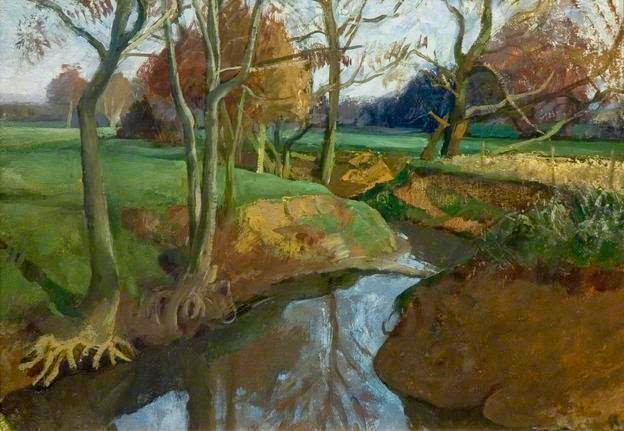Poetry provides inklings, not answers. Poetry is not religion or science or metaphysics or politics (for which we can all be thankful).
The world through which we walk is beautiful and heartbreaking. From stepping stone to stepping stone is the only way to traverse the ground.
. . . . . we should be careful
Of each other, we should be kind
While there is still time.
From Philip Larkin, "The Mower."
John Aldridge, "The River Pant Near Sculpin's Bridge" (1961)
We meet only to part,
Coming and going like white clouds,
Leaving traces so faint
Hardly a soul notices.
Ryokan (1758-1831) (translated by John Stevens), in Dewdrops on a Lotus Leaf: Zen Poems of Ryokan (Shambhala 1996).
Walter Goodin, "The River Beverley" (1938)
Afterpeace
This wind that howls about our roof tonight
And tears live branches screaming from great trees
Tomorrow may have scarcely strength to ruffle
The rabbit's back to silver in the sun.
Patrick MacDonogh Poems (edited by Derek Mahon) (The Gallery Press 2001).
Alfred Parsons (1847-1920), "Poplars in the Thames Valley"
Why should little things be blamed?
Little things for grace are famed;
Love, the winged and the wild,
Love is but a little child.
Anonymous (translated by Thomas Rogers), in Henry Wellesley (editor), Anthologia Polyglotta: A Selection of Versions in Various Languages, Chiefly from the Greek Anthology (1849).
George Vicat Cole, "Iffley Mill" (1884)







4 comments:
Stephen,
Ray Bradbury wrote something very similar, and I wish I could find it again, but it's lost in the past.
Anyway he said something to the effect that great literature doesn't cause problems nor does it provide solutions--it just reflects them.
We are all transitory.
This post brings to mind Keith Whitley's lovely old song:
"I'll be your stepping stone..."
Fred: yes, I think that some poets, writers, and artists claim too much for themselves. I find that the best, most truthful poets and artists are those who follow Lao Tzu's advice and keep quiet about what they are doing. If someone thinks their art is going to change the world, they are most likely not an artist. And they certainly aren't going to change the world.
As always, it's very nice to hear from you. Thanks for the thoughts.
Esther: thank you for stopping by once more, and for that musical connection. A lovely song -- and I presume that you are aware of George Jones's version of it as well.
Thanks again.
Post a Comment